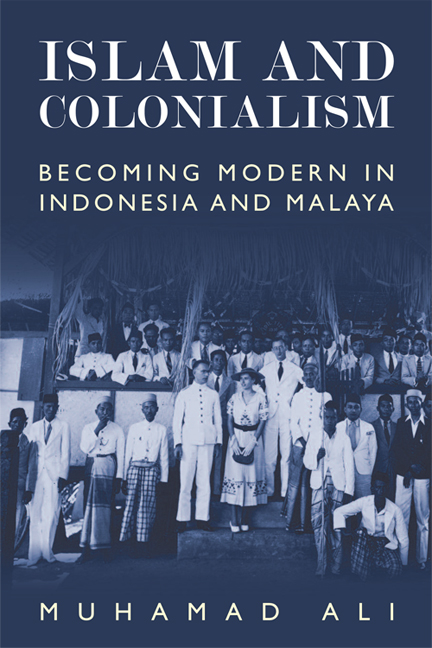Book contents
- Frontmatter
- Contents
- Glossary
- Acknowledgements
- List of Abbreviations
- Transcriptions and Orthography
- Map
- Introduction
- Part I Making Islam Modern
- Part II Modernising Politics and Government
- Part III Modernising Law
- V Integrating Shari'ah, Adat and European Laws
- VI Formalising Legal Plurality
- Part IV Modernising Education
- Conclusion
- Bibliography
- Index
VI - Formalising Legal Plurality
from Part III - Modernising Law
Published online by Cambridge University Press: 05 September 2016
- Frontmatter
- Contents
- Glossary
- Acknowledgements
- List of Abbreviations
- Transcriptions and Orthography
- Map
- Introduction
- Part I Making Islam Modern
- Part II Modernising Politics and Government
- Part III Modernising Law
- V Integrating Shari'ah, Adat and European Laws
- VI Formalising Legal Plurality
- Part IV Modernising Education
- Conclusion
- Bibliography
- Index
Summary
If there were a dispute between the religious figure and the adat figure or between the civil and military judges, the Governor General in Java would make a final arbitration according to the prevailing law.
(Het Departement van Binnenlandsch-Bestuur, The Office for the Native and Muhammadan Affairs, 1920)Initally local judges ignored new laws, preferring former customs and personal interests. As time went on, however, most judges studied the laws and improved their knowledge of new procedures.
(Millington 1927: 12–13)Both bureaucratic organisations and legal systems were important instruments of modernisation in colonial states. Europeans sought to secularise colonial legal systems by separating the modern from the traditional. In order to regulate the diverse ‘races’ in their colonies, they promoted modern law as rational, formal, written, fixed, systematic and practical (Weber in Gerth and Mills 1946: 220; Moosa 2009: 158). Their accounts and policies emphasised these aspects of ‘modern law’ in opposition to both religious and traditional laws, which were deemed outdated, primitive, informal, irrational, impractical or dispersed (Burns 2004: 47). However, colonial scholars also considered aspects of customary and Islamic laws to be compatible with modern practices of law as long as they did not contravene the principles Westerners regarded as universal. In Indonesia and Malaya, the conceptualisation of shari'ah as a legal system was also a product of European influence. This chapter examines the ways in which colonial authorities interpreted laws and attempted to standardise legal institutions in the colonies, while exploring the ways in which these authorities influenced local Muslim conceptions and practice of law.
Dutch and British scholars and administrators simultaneously formalised and differentiated among legal systems operating in the colonies (Hooker 1976, 1978a, 1978b). They defined civil or common law as modern law, shari'ah as Islamic law or hukum and various local customs as adat law. They studied the integration as well as tensions between shari'ah as Islamic law and adat. Europeans tended to view native Muslims as heterodox, claiming that they were so preoccupied by static adat that they did not follow strict Islamic law in full.
Although European legal scholars and legislators tended to compare Western legal ideals with local practices rather than equivalent customary and Islamic legal ideals, they sought to preserve aspects of customary and Islamic laws by integrating them into the colonial legal systems.
- Type
- Chapter
- Information
- Islam and ColonialismBecoming Modern in Indonesia and Malaya, pp. 193 - 220Publisher: Edinburgh University PressPrint publication year: 2015



